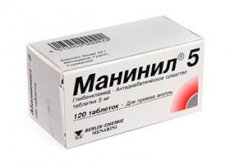Medical expert of the article
New publications
Preparations
Maninil
Last reviewed: 03.07.2025

All iLive content is medically reviewed or fact checked to ensure as much factual accuracy as possible.
We have strict sourcing guidelines and only link to reputable media sites, academic research institutions and, whenever possible, medically peer reviewed studies. Note that the numbers in parentheses ([1], [2], etc.) are clickable links to these studies.
If you feel that any of our content is inaccurate, out-of-date, or otherwise questionable, please select it and press Ctrl + Enter.

Release form
It is released in the form of tablets (3.5 or 5 mg). There are 120 tablets in a glass bottle. There is 1 bottle in a pack.
 [ 5 ]
[ 5 ]
Pharmacodynamics
Glibenclamide promotes activation of insulin production processes and enhances the insulin-secreting effect of glucose. The drug increases the cellular sensitivity of the pancreas to glucose-dependent insulinotropic polypeptide.
Increased sensitivity of receptors to insulin causes the development of extrapancreatic effects of the drug.
Medicinal doses of Maninil reduce the likelihood of such disorders as cardiopathy with retinopathy, as well as nephropathy. In addition, the drug reduces mortality associated with diabetes.
The drug has a cardioprotective and antiarrhythmic effect, so it is allowed to be used by diabetics who also suffer from coronary heart disease.
The substance glibenclamide reduces platelet aggregation and prevents the development of diabetes-related vascular complications.
Dosing and administration
Dosages are selected individually, taking into account the severity of the pathology, glucose levels and the patient's age. The average daily dose is about 2.5-15 mg. Glibenclamide should be taken in the morning and evening, before meals (30 minutes). Tablets should not be chewed.
The maximum dose allowed per day is 15-20 mg of the medicine, no more.
 [ 15 ]
[ 15 ]
Use Maninila during pregnancy
It is prohibited to use Maninil during pregnancy.
Contraindications
Among the contraindications:
- diabetes mellitus type 1;
- comatose state or precoma of the diabetic type;
- ketoacidosis;
- the presence of injuries or extensive burns on the body;
- hyperosmolar coma;
- pathologies of infectious genesis;
- leukopenia;
- kidney/liver failure;
- microangiopathy;
- intestinal obstruction.
Caution is required when using in cases of adrenal insufficiency, fever syndrome, alcoholism, and thyroid pathologies.
 [ 12 ]
[ 12 ]
Side effects Maninila
As a result of an incorrect diet or violations of the dosage regimen of the drug, hypoglycemia may develop. Among other side effects: fever, allergic symptoms, weight gain, dyspeptic disorders, arthralgia. In addition, proteinuria, cholestasis, neurological disorders, problems with liver function, disorders of hematopoiesis, polyuria and porphyria on the skin (late stage) develop. Photosensitivity and headache, severe fatigue and taste bud disorders may occur.
Overdose
Signs of poisoning include: hyperhidrosis, tremors, hunger, problems with vision, speech and consciousness, cerebral edema and other symptoms of hypoglycemia. In addition, increased heart rate, irritability, depression, insomnia, and coma.
To eliminate the violations, first of all it is necessary to use glucose. If the victim is unconscious, he is given dextrose intravenously by bolus, and in addition to this, diazoxide with glucagon is used. Then, at intervals of 15 minutes, blood sugar levels should be checked. To prevent recurrence of hypoglycemia, it is necessary to feed the victim food containing a lot of easily digestible carbohydrates. In case of cerebral edema, mannitol and dexamethasone are used.
 [ 16 ]
[ 16 ]
Interactions with other drugs
Among the drugs that potentiate the properties of Maninil are: ACE inhibitors, fibrates with NSAIDs, antifungals, coumarin anticoagulants, MAOIs, anti-tuberculosis agents, pentoxifylline with salicylates, tetracycline with biguanides and cyclophosphamides, chloramphenicol with fenfluramine, anabolics, β-blockers, disopyramide with acarbose and pyridoxine, as well as reserpine with bromocriptine and insulin with allopurinol.
The properties of the drug are weakened when combined with such drugs: barbiturates with anticonvulsants, calcium channel blockers, adrenergic stimulants and thiazide-type diuretics. In addition, chlorthalidone, carbonic anhydrase inhibitors, baclofen with furosemide and glucagon, asparaginase with terbutaline, ritodrine, isoniazid and danazol, as well as morphine with diazoxide, morphine with rifampicin, salbutamol and thyroid hormones. This group also includes lithium salts, chlorpromazine with niacin, estrogens and oral contraception.
The effects of the drug, as well as its reabsorption, are enhanced when taken with high doses of vitamin C and ammonium chloride.
Combined use with drugs that suppress hematopoietic processes in the bone marrow increases the likelihood of developing myelosuppression.
Storage conditions
Maninil should be kept in a place closed to children. The temperature mark should not exceed 25°C.
 [ 20 ]
[ 20 ]
Special instructions
Reviews
Maninil is a fairly popular remedy - according to reviews, it is considered quite effective, and at the same time inexpensive. It helps well in the treatment of type 2 diabetes.
At the initial stage of using the drug, negative reactions may occur, but they disappear on their own after a short period of time.
Shelf life
Attention!
To simplify the perception of information, this instruction for use of the drug "Maninil" translated and presented in a special form on the basis of the official instructions for medical use of the drug. Before use read the annotation that came directly to medicines.
Description provided for informational purposes and is not a guide to self-healing. The need for this drug, the purpose of the treatment regimen, methods and dose of the drug is determined solely by the attending physician. Self-medication is dangerous for your health.

